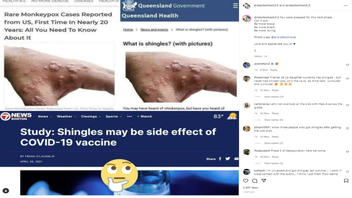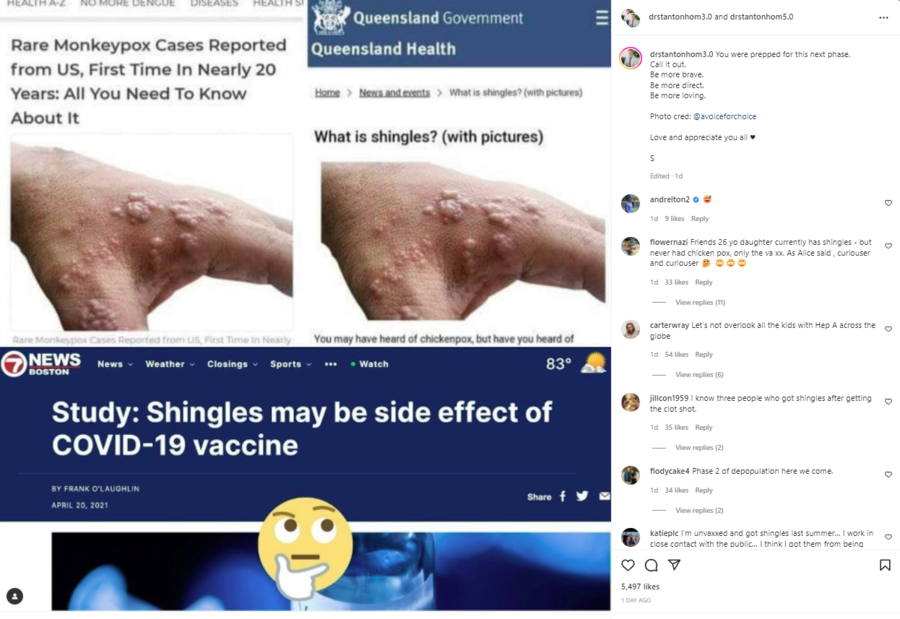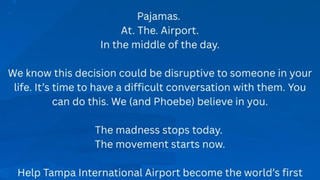STORY UPDATED: check for updates below.

Do COVID-19 vaccines cause monkeypox and shingles? No, that's not true: There's no evidence that either disease is caused by the shot for COVID. Both monkeypox and shingles are caused by specific viruses, neither of which are included in COVID-19 vaccines. But, even if the viruses were the same, the COVID shots still couldn't cause infection.
"Because none of the authorized COVID-19 vaccines in the United States contain the live virus that causes COVID-19, the vaccine cannot make you sick with COVID-19," the Centers for Disease Control and Prevention (CDC) said. The Food and Drug Administration (FDA) added: "The claims circulating on social media that COVID-19 vaccines cause monkeypox or shingles are completely false and have no basis in fact."
The claims appear in an Instagram post on May 22, 2022, under the title "You were prepped for this next phase." It opened:
Call it out.
Be more brave.
Be more direct.
Be more loving. ...
Love and appreciate you all ♥️
This is what the post looked like on Instagram on May 24, 2022:
(Source: Instagram screenshot taken on Mon May 24 16:18:59 2022 UTC)
If A = B and B = C, then A = C
The Instagram post falsely equates three things -- images from a Queensland, Australia, government website on shingles, an article from a health site in India on monkeypox that uses the same image as the shingles image used on the Queensland site and a news report on a limited study saying shingles may be a side effect of the COVID-19 vaccine. The post is saying that if A = B and B = C, then monkeypox and shingles are caused by COVID vaccines.
The post tries to prove the transitive property by visually linking shingles with monkeypox. The image from Queensland Health shows a photo of a rash purportedly caused by shingles. The Indian website, thehealthsite.com, used the same picture to illustrate a story on monkeypox. Monkeypox and shingles are not the same things, even though the double use of the same image suggests they are. In a May 24, 2022, email to Lead Stories, the CDC said:
There is no current connection between COVID-19 Vaccines and orthopoxviral infections, such as monkeypox, smallpox, and shingles. COVID-19 vaccination helps protect people from getting COVID-19. Some people have side effects from the vaccine, which are normal signs that their body is building protection. These side effects may affect their ability to do daily activities, but they should go away in a few days. Some people have no side effects, and allergic reactions are rare.
In a May 25, 2022, email to Lead Stories, the FDA added:
The claims circulating on social media that COVID-19 vaccines cause monkeypox or shingles are completely false and have no basis in fact. None of the FDA-approved or authorized COVID-19 vaccines can cause monkeypox or shingles. The vaccines do not contain these viruses.
Pfizer-BioNTech COVID-19 Vaccine/Comirnaty and Moderna COVID-19 Vaccine/Spikevax are made using genetic material called mRNA. The vaccines deliver a piece of mRNA that instructs cells in the body to make a copy of the distinctive 'spike' protein of SARS-CoV-2, the virus that causes COVID-19. The result of a person receiving mRNA vaccines is that their immune system will ultimately react defensively to the SARS-CoV-2 virus. The mRNA in is only present in the body for a short time and is not incorporated into, nor does it alter, an individual's genetic material.
The Janssen COVID-19 Vaccine is made using a viral vector made from a specific human virus called adenovirus type 26 (Ad26). The vaccine uses Ad26 to deliver a piece of the DNA (genetic material) that is used to make the distinctive 'spike' protein of the SARS-CoV-2 virus. While adenoviruses are a group of viruses that are relatively common & can cause cold symptoms & pink eye, the Ad26 vector has been modified so that it can't replicate in the human body to cause illness.
Jynneos is a vaccine approved by FDA in 2019 for the prevention of smallpox and monkeypox disease in adults 18 years of age and older determined to be at high risk for smallpox or monkeypox infection. The vaccine does not contain the viruses that cause smallpox or monkeypox.
Jynneos is made from a vaccinia virus, a virus that is closely related to but less harmful than the viruses that cause smallpox (variola virus) or monkeypox and can protect against both of these diseases. Jynneos contains a modified virus (Modified Vaccinia Ankara), which does not cause disease in humans and is non-replicating, meaning it cannot reproduce in human cells.
The study
That leaves the study from a WHDH-TV news article with the headline: "Study: Shingles may be side effect of COVID-19 vaccine." The very limited study involved six people with autoimmune inflammatory rheumatic diseases (AIIRD), not the general population. The findings were published in the British Society of Rheumatology in April 2021:
Epidemiologic studies on the safety of the mRNA-based COVID-19 vaccines in patients with AIIRD are needed to clarify the association between the BNT162b2 mRNA [Pfizer] vaccination and reactivation of zoster [the virus that causes shingles].
Bottom line: The study represents at most a tiny fraction of the hundreds of millions of people receiving the shots.
In a May 24, 2022, email to Lead Stories, Pfizer Global Media Relations said:
The COVID-19 vaccine does not contain any live virus and is completely synthetic. Furthermore, it does not shed any virus transmitting from human to human. With monkeypox, human-to-human transmission occurs through close contact with infectious material from skin lesions of an infected person, through respiratory droplets in prolonged face-to-face contact, and through fomites. Shingles is caused by varicella zoster virus (VZV), the same virus that causes chickenpox. After a person recovers from chickenpox, the virus stays dormant (inactive) in their body. The virus can reactivate later, causing shingles. If you have shingles, direct contact with the fluid from your rash blisters can spread VZV to people who have never had chickenpox or never received the chickenpox vaccine. If they get infected, they will develop chickenpox, not shingles. They could then develop shingles later in life. People with shingles cannot spread the virus before their rash blisters appear or after the rash crusts.
Updates:
-
2022-05-25T17:20:44Z 2022-05-25T17:20:44Z Adds statement from Food and Drug Administration.


















